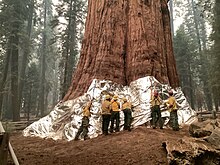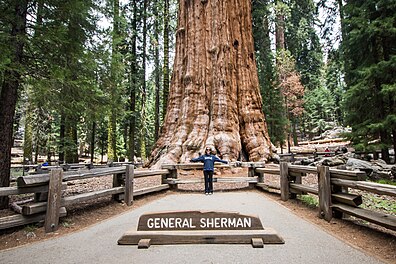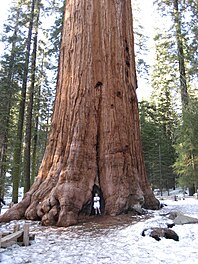| General Sherman | |
|---|---|
 General Sherman General Sherman | |
 | |
| Species | Giant sequoia (Sequoiadendron giganteum) |
| Coordinates | 36°34′54″N 118°45′05.5″W / 36.58167°N 118.751528°W / 36.58167; -118.751528 |
| Height | 83.8 m (275 ft) |
| Diameter | 11 m (36 ft) |
| Volume of trunk | 1,487 m (52,500 cu ft) |
| Date seeded | between 700 BC and 300 BC |
General Sherman is a giant sequoia (Sequoiadendron giganteum) tree located at an elevation of 2,109 m (6,919 ft) above sea level in the Giant Forest of Sequoia National Park in Tulare County, in the U.S. state of California. By volume, it is the largest known living single-stem tree on Earth.
History
The General Sherman tree was named after the American Civil War general William Tecumseh Sherman. The official story, which may be apocryphal, claims the tree was named in 1879 by naturalist James Wolverton, who had served as a lieutenant in the 9th Indiana Cavalry under Sherman.
Seven years later, in 1886, the land came under the control of the Kaweah Colony, a utopian socialist community whose economy was based on logging. Noting the pivotal role that Sherman had played in the Indian Wars and his forced relocation of native American tribes, they renamed the tree in honor of Karl Marx. However, the community was disbanded in 1892, primarily as a result of the establishment of Sequoia National Park, and the tree reverted to its previous name.
In 1931, following comparisons with the nearby General Grant tree, General Sherman was identified as the largest tree in the world. One result of this process was that wood volume became widely accepted as the standard for establishing and comparing the size of different trees.
In January 2006, the largest branch on the tree (seen most commonly, in older photos, as an "L" or golf-club shape, protruding from about a quarter of the way down the trunk) broke off. There were no witnesses to the incident, and the branch—with a diameter of over 2 m (6.6 ft) and a length of over 30 m (98 ft), larger than most tree trunks—smashed part of the perimeter fence and cratered the pavement of the surrounding walkway. The breakage is not believed to be indicative of any abnormalities in the tree's health and may even be a natural defense mechanism against adverse weather conditions.

On September 16, 2021, the tree was threatened by the KNP Complex Fire in Sequoia National Park. Park and firefighting personnel wrapped the tree's base in a protective foil usually used on structures in case the wildfire approached the General Sherman Tree—which, in the end, was left unharmed.
Dimensions
While it is the largest tree known, the General Sherman Tree is neither the tallest known living tree on Earth (that distinction belongs to Hyperion, a Coast redwood), nor is it the widest (both the largest cypress and largest baobab have a greater diameter), nor is it the oldest known living tree on Earth (that distinction belongs to a Great Basin bristlecone pine). With a height of 83.8 meters (275 ft), a diameter of 7.7 m (25 ft), an estimated bole volume of 1,487 m (52,513 cu ft), and an estimated age of 2,300–2,700 years, it is nevertheless among the tallest, widest, and longest-lived of all trees on the planet.
While General Sherman is the largest currently living tree, it is not the largest historically recorded tree. The Lindsay Creek Tree, with more than 90,000 cubic feet (2,500 cubic meters) almost twice the volume of General Sherman, was reported felled by a storm in 1905. Another larger tree, the Crannell Creek Giant, a coast redwood (Sequoia sempervirens) cut down in the mid-1940s near Trinidad, California, is estimated to have been 15–25% larger than the General Sherman Tree by volume. Similarly, the Mother of the Forest, another giant sequoia, may have historically been larger than General Sherman. Two other historical and exceedingly enormous giant sequoias, the Discovery Tree with a near-30 metres (98 ft) circumference, and especially the long-fallen "Father of the Forest" from Calaveras Grove, reportedly 435 feet (133 m) high and 110 feet (34 m) in circumference, are widely considered to have once been larger than General Sherman. In addition, the Burnt Monarch from Big Stump Grove had a much larger base than General Sherman and could have easily been larger as well.
| Height above base | 274.9 ft | 83.8 m |
|---|---|---|
| Circumference at ground | 102.6 ft | 31.3 m |
| Maximum diameter at base | 36.5 ft | 11.1 m |
| Diameter 4.50 ft (1.37 m) above height point on ground | 25.1 ft | 7.7 m |
| Girth Diameter 60 ft (18 m) above base | 17.5 ft | 5.3 m |
| Diameter 180 ft (55 m) above base | 14.0 ft | 4.3 m |
| Diameter of largest branch | 6.8 ft | 2.1 m |
| Height of first large branch above the base | 130.0 ft | 39.6 m |
| Average crown spread | 106.5 ft | 32.5 m |
| Estimated bole volume | 52,508 cu ft | 1,487 m |
| Estimated mass (wet) (1938) | 2,105 short tons | 1,910 t |
| Estimated bole mass (1938) | 2,472,000 lb | 1,121 t |
Gallery
See also
- List of largest giant sequoias
- List of superlative trees
- List of individual trees
- List of oldest trees
- National Register of Big Trees
References
- ^ "The General Sherman Tree". Sequoia National Park. U.S. National Park Service. March 27, 1997. Retrieved August 12, 2011.
- Tweed, William (September 26, 2014). "A famous name and a mystery". Visalia Times-Delta and Tulare Advance-Register. Retrieved May 21, 2020.
- Miller, Daegan (2018). This Radical Land; A natural history of American dissent. University of Chicago Press.
- Van Pelt, Robert. "The Trees". Forest Giants. Archived from the original on July 11, 2011.
- Tweed, William (February 7, 2006). "Sequoias designed to last a couple of thousand years". Visalia Times Delta.
- "California fires: General Sherman and other sequoias given blankets". BBC News. September 17, 2021. Archived from the original on March 7, 2023. Retrieved March 27, 2023.
- Ebrahimji, Alisha; Elam, Stephanie (September 17, 2021). "Officials wrapped the world's largest tree in protective foil to guard it against California wildfires". CNN. Archived from the original on December 9, 2022. Retrieved March 27, 2023.
- Earle, CJ (2011). "Sequoia sempervirens". The Gymnosperm Database. Retrieved August 12, 2011.
- Earle, CJ (2011). "Pinus longaeva". The Gymnosperm Database. Retrieved August 13, 2011.
- Stephenson, N.L. (January 2002). "Estimated Ages of Some Large Giant Sequoias: General Sherman Keeps Getting Younger". Nature Notes. 2. Yosemite Association. Archived from the original on March 23, 2012. Retrieved May 3, 2011.
- Martin, Glen (September 7, 2006). "World's tallest trees". The San Francisco Chronicle. Retrieved January 29, 2009.
- Records, Guinness World (2007). Guinness World Record 2008, World's Tallest Tree. Guinness World Records. ISBN 978-1-904994-19-0. Retrieved January 29, 2009.
- "535,000 board feet of merchantable timber" Largest Tree Ever Recorded (UBC Botanical Garden, February 4, 2010)
- Vaden, Mario D. "Crannell Creek Giant".
- Landmark Trees. "Crannell Creek Giant".
- "Placer Herald 9 July 1853 — California Digital Newspaper Collection".
- ""Father of the Forest", a Giant of Giants--fallen centuries ago--originally 435 ft. High, 110 ft. Cir., Calaveras Grove, Cal". Library of Congress.
- Forest Giants of the Pacific Coast. Van Pelt, 2001
- ^ Flint, Wendell D. (1987). To Find the Biggest Tree. Sequoia National History Association. p. 94.
- ^ Fry, Walter; White, John Roberts (1942). Big Trees. Palo Alto, California: Stanford University Press. ISBN 9780804716383.
- "General Sherman Tree". Geographic Names Information System. United States Geological Survey, United States Department of the Interior.
External links
- "What is the largest tree in the world?" Video of a park ranger at Sequoia National Park explaining details about the General Sherman Tree
- Norton, Marc. "The Karl Marx Tree: How Southern Pacific Railroad killed a socialist colony in the name of creating Yosemite National Park", Red Hills, August 27, 2014.









